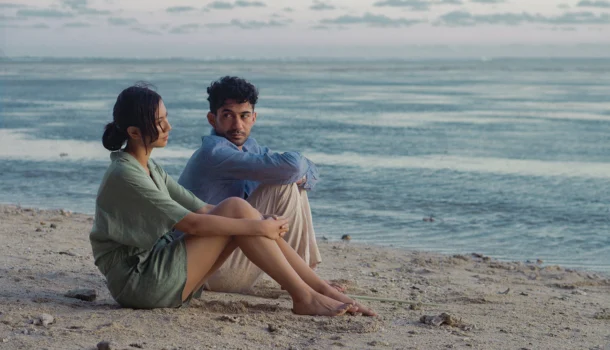Some films don’t rely on major plot twists or elaborate structures to capture the audience’s attention — all they need is a precise balance of rhythm, charisma, and a setting that acts as an extension of the characters’ emotions. “The Most Beautiful Girl in the World” falls into that category of understated narratives that, by resisting the temptation of easy spectacle, build authentic bonds with the viewer. Anchored in everyday gestures and subtle tensions, the film offers more of a relational experience than a dramatic one. What’s presented to the audience isn’t a puzzle to be solved, but a shared atmosphere to be felt — one in which emotions aren’t declared, but quietly intuited.
The connection between the protagonists, portrayed with emotional precision by Reza Rahadian and Sheila Dara, lends authenticity to the film’s emotional journey. There’s no room for artificially poetic dialogue or meticulously staged interactions: what sustains the story is the pair’s ability to express emotion through restrained gestures and meaningful glances. Rahadian proves himself a performer skilled at shifting between restraint and intensity, while Dara brings a measured sweetness to her role that feels organic and never overplayed. Their chemistry is not fueled by grand emotional peaks but by the accumulation of small, resonant moments that hold together the emotional core of “The Most Beautiful Girl in the World.”
The narrative structure avoids immediacy and opts instead for a gradual, patient build-up that respects the internal rhythms of its characters and their conflicts. The direction resists stylistic excess, allowing the story to breathe and making space for immersive engagement. However, not every emotional arc achieves the same depth. Kiara’s abrupt change of heart toward Reuben, for instance, lacks the development needed to make it convincing. Her transformation feels imposed by the script rather than earned through the story’s progression. This shortcoming weakens the character’s internal coherence and dilutes the emotional impact of the resolution — a misstep that contrasts with the film’s otherwise thoughtful handling of emotional bonds.
One of the film’s most distinctive features is its use of Indonesia’s natural landscapes — not as mere backdrop, but as a narrative device. The carefully curated color palette doesn’t just beautify; it heightens emotional states. A key sequence set on a remote island — which could easily have been reduced to symbolic scenery — instead becomes a relational laboratory for the characters. In this isolated space, defenses fall away and vulnerabilities emerge. It’s not a turning point driven by spectacle, but a quiet maturation that deepens the audience’s empathy. At this moment, “The Most Beautiful Girl in the World” demonstrates a refined sensibility, allowing its setting to speak with the same eloquence as its dialogue.
Yet, the depiction of the male protagonist as a stereotypical playboy feels misaligned with the film’s overall emotional sensitivity. The attempt to impose a “bad boy” archetype comes across as artificial, especially since it’s unsupported by his behavior throughout the rest of the story. This inconsistency suggests an effort to fit the character into a pre-established mold, weakening the logic of his emotional trajectory. If the goal was to highlight his transformation through contrast, the lack of a convincing path undermines it. The result is a misplaced caricature in a context that demands nuance — one of the few cracks in a film that, for the most part, demonstrates remarkable dramatic integrity.
Still, “The Most Beautiful Girl in the World” holds up as an invitation to emotional involvement, despite its minor imperfections. The screenplay, though occasionally leaning on easy shortcuts, prioritizes listening and silence, encouraging the audience to uncover — rather than consume — the story. The desire to see this narrative expanded into a series feels inevitable, not just out of curiosity, but because so many of its dramatic potentials could benefit from more space to grow. Rather than leave behind fleeting impressions, this fictional universe deserves further unfolding — one that honors its most promising element: the tenderness with which it explores connection, distance, and the fragile gestures that shape our bonds.
Film: The Most Beautiful Girl in the World
Director: Robert Ronny
Year: 2024
Genres: Comedy/Drama/Romance
Rating: 7/10

